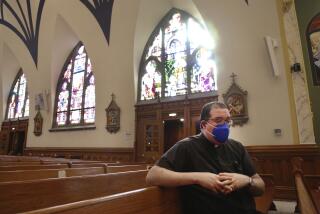Survey Finds Upsurge in Religious Devotion
- Share via
Researchers who surveyed people in 13 countries say that religious devotion is at a high point in the United States, and that in Eastern Europe youths are sharing with their grandparents a resurgence in religious beliefs.
“Religion, to put the matter briefly, has not disappeared around the world, and indeed shows some signs of new vitality,” concludes a report released Monday by the International Social Survey Program study of religion.
The program is run by a consortium of social science research centers in 21 countries. The study on religion involved national samples of at least 1,000 people in each participating country--the United States, Ireland, Northern Ireland, Poland, Italy, Hungary, Holland, New Zealand, Germany, Norway, England, Slovenia and Israel.
Survey coordinators said the margin of error would be different for each country, but in general would not exceed plus or minus four percentage points. The surveys were done in 1991 and early 1992.
With the exception of eastern Germany and the Netherlands, majorities of the people responding in all of the countries reported a belief in God and a religious affiliation.
More than 90% of the respondents in the United States and Ireland and 80% of the respondents in Poland and Italy reported a belief in God, as did more than two-thirds in Israel, England and New Zealand.
In the survey, church attendance lagged behind belief, but majorities reported attending regularly in Ireland and Poland, and more than 40% said they were frequent churchgoers in the United States and Italy.
“The decline in religion that was predicted with the baby boomers simply didn’t happen,” the Rev. Andrew Greeley, a sociologist from the University of Chicago and the study’s author, said.
There were several signs of renewed religious interest in Eastern Europe, the study said.
For example, in Hungary, the report said, only a little more than a quarter of Hungarians said they that they had ever attended church when asked in 1986, a time when churchgoing was officially discouraged. In the 1991 survey, two-thirds said they attend church services. The percentage of frequent churchgoers had more than tripled since 1986, from 6% to 19%.
But Greeley said the most striking phenomenon in Eastern Europe was the increasing belief in life after death--a central tenet of the Christian faith.
Although middle-aged people raised almost entirely under socialism were less likely to believe in life after death, the share of believers among young people who have seen the fall of communism was as high in some cases as those of grandparents who held religious beliefs before socialism, the study said.
One authority on world religion said the results seemed to show how events in Eastern Europe have reversed predictions that there would be an inevitable decline in religious belief in the modern age.
More to Read
Sign up for Essential California
The most important California stories and recommendations in your inbox every morning.
You may occasionally receive promotional content from the Los Angeles Times.











